For an outdoor man, military personnel, or a wild hunter, the need for an optic lens that aids in seeing far distances is fundamental.
While it is elementary for you to pick either a monocular or a pair of modern binoculars, knowledge of both can provide a wide range of benefits.
In this article on monocular vs binoculars, we will be looking at both optic devices based on their similarities and differences.
This way, we will provide you with all the necessary information you need while choosing any of the two.
Monocular vs Binoculars: Which One to Choose
The monoculars and the binoculars are both optical devices that can be used to see a target object, person, and people at a long distance.
These two devices have been designed in such a way that one functions just like the other. While the majority and visible difference between the two still remains in the number of lenses, there are still some differences.
Let’s start our “binocular vs monocular” with a short introduction to both devices.
1. What’s a Monocular?
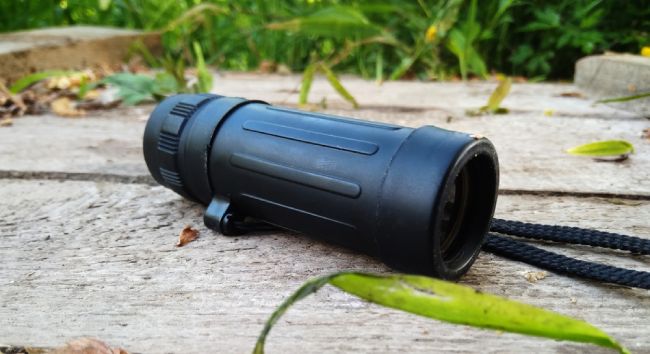
In theory, a monocular is a one-lens optical device that aids long-distance sight for those who need to see that far for hunting or shooting purposes.
As a device, the monocular is relatively smaller in size. It is light in weight and comes all compact. Many people often refer to monoculars as a more innovative form of the ancient telescope, which still serves the same purpose.
While a night vision monocular is a household name to the military and surveillance folks, it is not so common in the marketplace.
This device comes in various sizes, power capacities, and prices. When choosing a monocular, it is always best to choose carefully and wisely because if you don’t know what you will use it for, it could render useless.
2. What Are Binoculars?
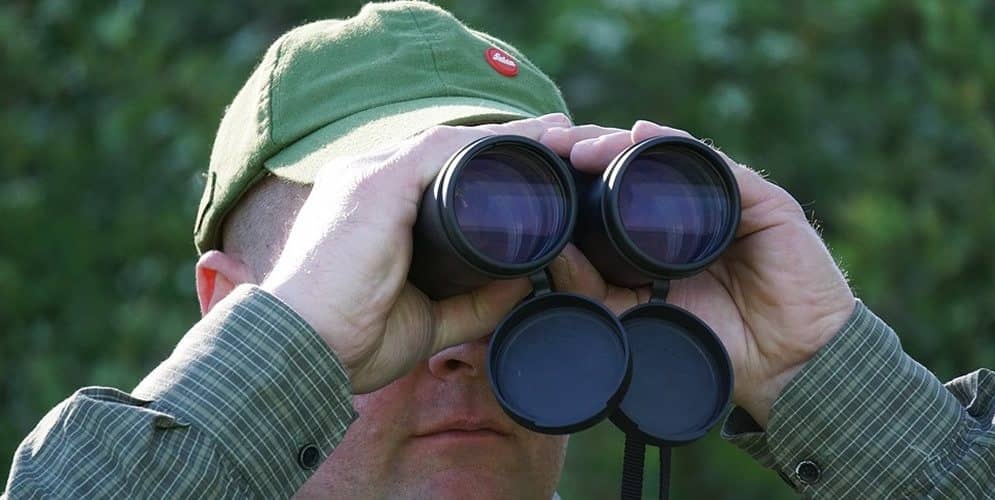
Unlike a monocular, a binocular is a two-lens optical device (bi = two) that aids sight. This device helps you see objects at long distances using your two eyes simultaneously.
These devices are much more common among individuals globally. Binoculars come in different types and sizes. Recently, more and more color options are becoming available.
No major optic company on the globe today doesn’t produce high-end binoculars considering their importance to sightseeing.
Just like monoculars, they are also widely used among the military, but not limited to them alone. Other people, especially outdoor adventurers, use binoculars for their activities as well.
In terms of construction and functionality, many similarities exist between monoculars and binoculars. Still, they are different from each other in many ways.
You need to understand the difference between monoculars and binoculars if you want to make a wise buying decision or use any of them.
3. Key Components and Functions
In terms of components in structures, the monocular and binoculars are similar in several regards. When it comes to the essential functions, you will also find that both are similar in functions too.
However, there is a thin line between the structural components and functions of both devices. We will be exploring this thin line shortly as we outline each component.
Magnification
The magnification power of an optical device allows you to know how much the device can view the image clearer and better than it should.
The magnification power of a monocular comes differently. It’s usually based on the size of the monocular. Larger monoculars are said to have better and higher magnification than smaller ones.
This makes it easier and more precise to see objects in the lens when using a larger monocular.
With a binocular, the magnification power takes a slightly different tone. Being a two lenses device, a binocular has both lenses operating at the same magnifying ability.
Binoculars may challenge the user in the event that better magnification levels are expected. So when using binoculars, it is always better to keep the magnification minimal for an enhanced experience.
When choosing either a binocular or monocular based on magnification, it is essential to know its purpose. For example,
military personnel will find a binocular’s magnification power better than a monocular’s. On the other hand, outdoor men will find the magnification power of a monocular better to use than that of binoculars.
Objective Lens
The objective lens is the front lens of the device and has its diameter measured in millimeters. With a monocular, it is always best to go for one with a larger objective lens measurement above that with a smaller lens.
This will ensure vision improvement and not just make you see objects through the lens but see them clearly enough.
The objective lens of a binocular comes based on the size of the binoculars. Larger-size binoculars have an objective lens with a larger diameter measurement than binoculars of smaller size.
A binocular has twice the size of the objective lens of a monocular, which means better optical quality.
The farther the object to be viewed is, the better it is to go for an optical device with a better objective lens for quality and clarity of view.
This means that binoculars are best if you are getting an optical device to see farther distances. Monoculars, on the other hand, are best for handling not-so-far distances.
Field of View
The field of view is that component of an optical device that allows you to know the territory you can view per time.
With a monocular, the field of view is measured in feet against the yard to be viewed. This means that you can see about 300 feet for a fence of 500 if your monocular has a field-of-view ratio of 300 feet to 500 yards.
On the other hand, Binoculars have a two-lens optical device for better field-of-view and performance.
Serving the same purpose as a monocular, you can see twice the field of view to the yardage ratio of a monocular when using a binocular.
As the magnification of binoculars increases, the field of view reduces. You can only see more when the magnification is winded down.
Keep in mind that just like other components, the FOV capacity to be noted is based on the purpose for which it is used.
Eye Relief
How far or close can your eyes be from the eyepiece to have a clear view of what is in sight? This can only be known by the eye relief of the optical device.
Just like the objective lens, this is measured in millimeters. The eye relief of a monocular requires that the device is placed closer to the eyepiece to have a better view of the object in sight.
Binoculars, on the other hand, vary in terms of eye relief. While some binocular types require that your eyes are placed just in front of the eyepiece, others provide for a little distance, and a few others a longer distance.
Wearing glasses when using binoculars might make eye relief a critical feature for you. For those whose sight is aided by glasses, like me, the best option is to go for a monocular.
Lens Coating
The thickness of the lens is what is defined as lens coating. This thickness has an impact on the brightness level. Monoculars have different lens coatings based on size or type.
While some are uncoated, others are fully coated. We also have some monoculars that are partially multi-coated and others that are fully multi-coated.
The same is valid for binoculars as well. While some come partially coated, others come fully coated. You should also bear in mind that the coating of both lenses isn’t the same.
Since coating affects the brightness of the image, it is advised that you take note of it regardless of whether it is monocular or binoculars. Go for a lens with the best coatings for the best brightness.
Clear Focus
Clear or close focus is the minimum distance existing between the optics, and the object is focused on. Monoculars have their clear focus measured differently depending on the model of the device.
While some models have their clear focus measured in inches, others are measured in yards.
Binoculars being two less, have shorter minimum distances at which they can focus on an object. This makes them provide a more spectacular viewing of the object focused on than a monocular.
Soldiers are advised to use binoculars because they require more precise focus. Other individuals can go for monoculars, especially for outdoor and wildlife hunting, because their clear focus will suit them more.
4. Some Brilliant Features to Help You Decide Monocular or Binoculars
To appreciate this article on monocular vs binoculars better, let us look at the excellent features these optic devices possess that set them apart from each other and make them unique to themselves.
Brilliant Features of monocular
- They come with an impressive zoom power
- They have an inbuilt compass to keep track
- Possesses a rangefinder to inform you of the range covered
- They have a built-in image stabilizer
- They come in really compact designs, some of which can be folded
Brilliant Features of Binoculars
- They possess an independent focus
- They have image stabilization features
- They have an impressive range-finding ability.
- They also possess ballistic reticles.
- They come with built-in inclinometers.
5. Difference Between Monoculars and Binoculars: Usability Compared
With the component differences between the monoculars and binoculars compared above, let’s compare both in terms of usability.
Here we are going to be looking at the various purposes for which both devices can be used and why they are best for such purposes.
Astronomy Purposes
Let’s figure out which one is better, monocular vs binocular for astronomy.
Observing the stars and their activities at night is what astronomers do.
To do this, an optical device is needed. Because of its magnification power and clear focus, a monocular helps the astronomer have a clear view of the sky.
With a clear view, the astronomer can read the stars and their activities clearly.
On the other hand, binoculars can be better for astronomy purposes, primarily because of their magnification and ability to see a broader range of field of view per time. This way, several activities in the sky can be covered and recorded.
As an amateur astronomer, using binoculars is the best option for precision and comfort. As you advance through the ranks, you can opt for monoculars, considering the quality of their field of view and objective lens.
However, a telescope works better than both.
Hunting Adventures
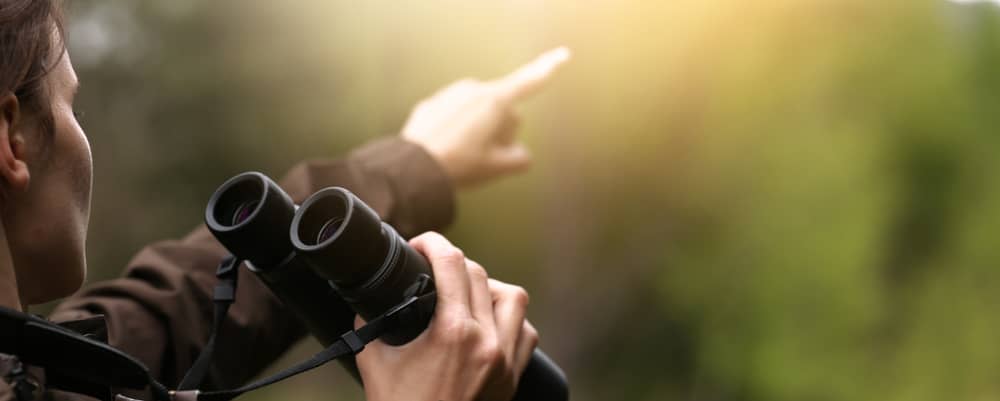
Another use of optic devices is for hunting. This might surprise you, but monoculars win the “binoculars vs monoculars for hunting” debate, hands down.
Typically, monoculars have been the most adopted optical devices among wildlife hunters. This is because it allows them to concentrate more and achieve better precision.
With a monocular, hunters can create a simple connection between their sight and their mind. However, you need to know how to maximize your experience with a device.
On the other hand, binoculars have also been proven suitable for hunting adventures because of their better field of view and clearer focus. With binoculars, hunting and tracking prey in its totality into a broader region becomes very much possible.
As a beginner, a pair of hunting binoculars might be best to help improve your hunting skill. It will help to keep you more informed about a larger part of the adventure field, keeping you safe and your target assured.
Hiking and General Observations
Do you know that hikers and wildlife observers also use binoculars and monoculars? Yes, they do for better hiking and observation experience. With hiking and wildlife observation, a monocular is best if it is more of a leisure activity than a serious one.
This way, you are more comfortable and can use them faster and better. Monoculars for hiking are way easier to operate than binoculars.
However, more compact binoculars might be a good idea. With a binocular, you can take more advanced photographs, have a better view of nature’s finest moments, and, most importantly, you can always tell what lies ahead.
Bird Watching
When bird watching is your hobby, monoculars can be best to have more close focus distances. They are also more mobile as they can be placed in your pocket, located, and used efficiently.
They feel best to use when you have mastered how to use one.
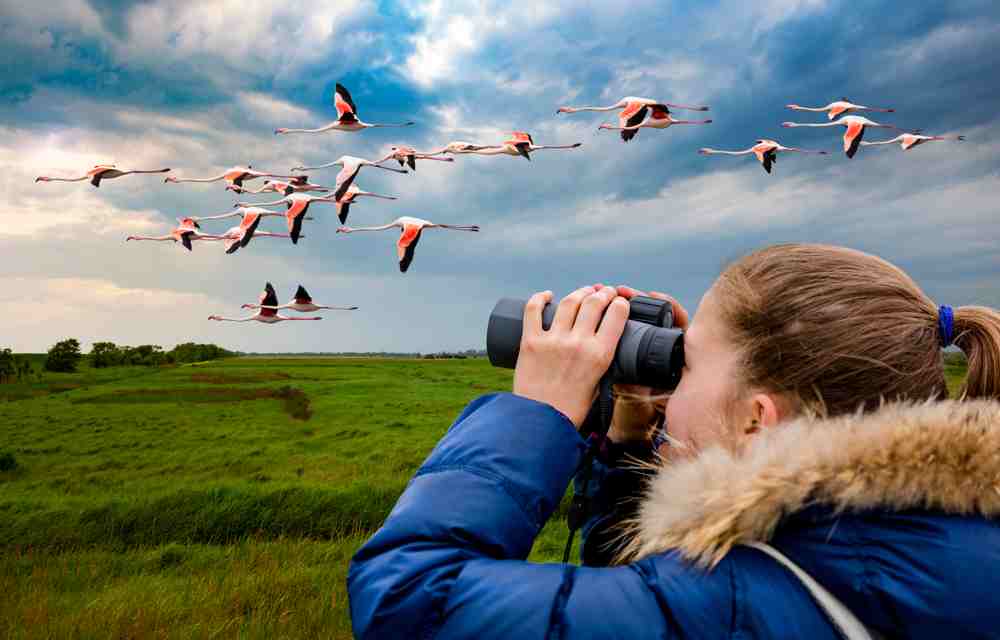
However, when it comes to serious and more professional bird watching, contemplate only going for a binocular. With a binocular, you have all the steadfastness and balance needed to glance at the sight for a longer period.
Surveillance and Tactical Works
In terms of usability, both monoculars and binoculars can be used for surveillance and other tactical work.
With the advancement of modern technology, the military has begun to adopt more sophisticated monoculars to carry out late-night surveillance and other tactical works on the battlefield. This is because of portability and reliability.
The comfort and effectiveness the binoculars offer in surveillance and tactical work should also be emphasized.
Binoculars help you to be more precise in approach and offer a better field of view than monoculars do.
Indoor Applications
You may be a lover of optical lenses and use them indoors. If this is you, monoculars are good for you because indoor applications require less professionalism.
Binoculars are not a bad idea, too, provided you know how to handle them. If they are your choice, what’s stopping you? Go for them and use them for whatever indoor application you are getting them for.
6. Monocular vs Binoculars: The Key Takeaway
Quickly in this article, let us look at some of the key takeaways as to the advantage one of these optic devices has over the other.
- Binoculars are much more durable and comfortable to use than monoculars.
- Binoculars are known to fit in well for more rigorous and professional tasks than monoculars can.
- Binoculars come in more impressive design structures than monoculars.
- Monoculars have less weight than binoculars making them better and faster to use than binoculars.
- Monoculars have a more excellent look-through lens view than binoculars.
- Most monocular models have a better price-to-quality ratio than binoculars do.
- The comfort of using a binocular gradually begins to drop when used for an extended period.
Much, if not everything, has been said about monocular vs binoculars, including what they are and what they can do. The bottom line is that the best binoculars or monoculars are not necessarily the most expensive. They are just the ones used for the purpose they best fit per time.
FAQs
1. Can I use a monocular as a telescope?
Ans. Monoculars are often seen as a portable alternative to small telescopes like spy glasses. Still, they don’t offer the same level of magnification that a telescope will provide.
2. Are monoculars or binoculars better for stargazing?
Ans. A monocular field of view (FOV) can be compared to a small telescope. While binoculars offer a wide-angle view, a monocular allows you to target a spot precisely with less FOV. For stargazing, a lesser FOV is always better than a wider FOV.
3. Are monoculars better than binoculars?
Monoculars offer a wide field of view, making them ideal for general wildlife and birding observation and scouting out the terrain. However, some monoculars can be bulky and difficult to operate with one hand, which is an inconvenience if you need to scan your surroundings for a specific object or creature.
Binoculars are preferred by many birders and nature enthusiasts, as they allow you to view an object with both eyes, resulting in a 3-dimensional effect. Binoculars also have a greater magnification power. Which one is better depends largely on the user and for what purposes they are using it.

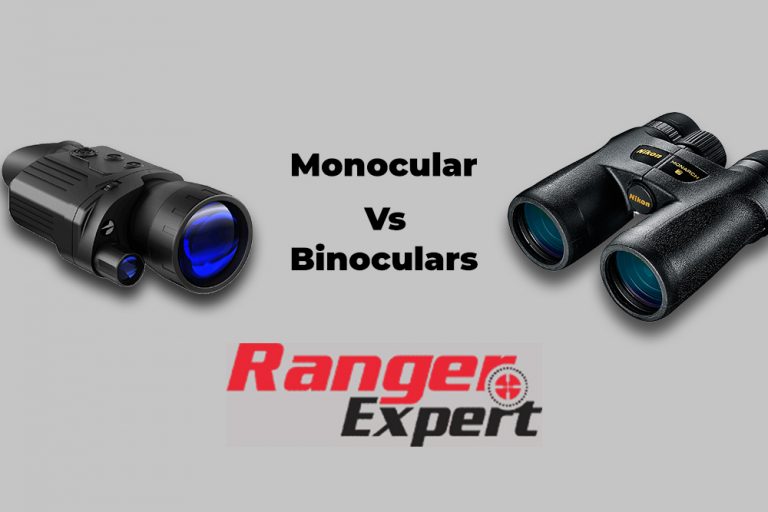



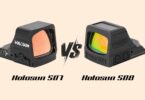
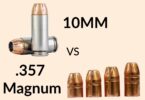


Leave a Comment